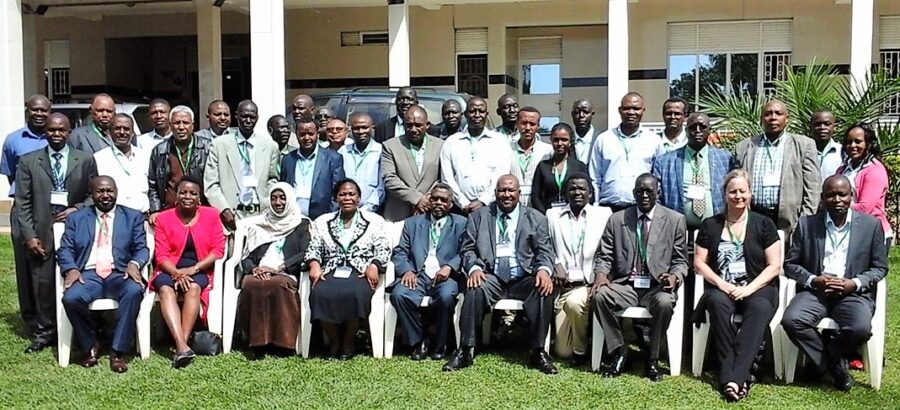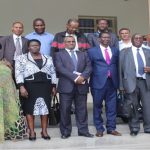1.0 Introduction
The Standard Methods and Procedures in Animal Health (SMP-AH) project organized a Regional Technical Cross-border meeting involving Ethiopia, Kenya, Sudan, South Sudan, Tanzania and Uganda in Entebbe from 6th to 10th February 2017 to develop joint activities and implementation frameworks. The cross-border meeting mainly focused on (1) the multilateral MoU involving Ethiopia, Kenya, South Sudan and Uganda, (2) Sudan and Ethiopia and (3) Kenya and Tanzania A total of 41 participants drawn from Ethiopia, Kenya, Sudan, South Sudan, Tanzania, Uganda, AU-IBAR, IGAD and FAO attended the meeting. The meeting was attended by senior experts running veterinary services in the countries with appropriate representation from national and county or state or districts levels as regards respective cross-border areas.
In his remarks, Dr Joseph Magona on behalf of the Director of the IGAD Centre for Pastoral Areas and Livestock Development (ICPALD)-Dr Solomon Munyua, noted that IGAD promoted regional and to allow for development within the livestock sector in the region, there was need for free movement of pastoralists across borders for water, pasture or trade. He explained that the meeting was organized to support development of implementation frameworks and to finalize MoUs between selected countries within the region. He noted that the livestock sector within the IGAD region still incurred heavy losses from outbreaks of transboundary animal diseases as a result of free movement of livestock and a huge population of wildlife across the border. He noted that for effective regional control of transboundary animal diseases there was need for close cooperation, collaboration and integration of disease control efforts with the region. Such relations have to be maintained through cross-border meetings, bilateral Memoranda of Understanding and jointly implemented cross-border frameworks. He re-affirmed IGAD continued support for cross-border cooperation between countries in many development endeavors.
In his remarks, Dr James Wabacha, on behalf of the Director of African Union Interafrican Bureau for Animal Resources (AU-IBAR) – Prof. Ahmed Elsawalhy, acknowledged the good representation from the cross border areas in the region. He stressed that main purpose for the implementation of uniform SPS measures through the SMP-AH project was to promote inter and intraregional livestock movement and trade. To achieve this purpose AU-IBAR and ICPALD through the support of USAID/KEA designed regional umbrella programs for TADs where all seven countries subscribe. The basis for the Umbrella program is Standard Methods and Procedures (SMPs) Programs for each priority disease. Given movement of livestock across borders and transboundary nature of TADs, regional harmonization and coordination was particularly important for effective disease control. He stressed that cross-border cooperation was of paramount importance; for effective communication, sharing disease information and regional collaboration among countries in support of livestock movement and trade; provided opportunities for joint disease control activities. For sustainability of cross border interventions, He urged countries to pick up the project gains and sustain them.
In his remarks, Dr. Sam Okuthe on behalf of FAO-ECTAD informed members that ECTAD was a project in FAO that dealt with Transboundary Animal Diseases (TADS) in 12 countries within the Eastern Africa including, IGAD, EAC and DRC. He stated that the project was funded under Global framework for eradication of TADS. He further stated that FAO supported disease control activities in the region by providing vaccines and staff facilitation. He informed members a team from his organization was already on the ground helping in investigating the outbreak of Avian Influenza outbreak in Uganda.
In her remarks, Dr Tracy McCracken on behalf of USAID/KEA Mission, informed members that the United States of America government was committed to supporting animal health programmes in the region. She informed members that as the funding institution they were happy with the achievement of SMP-AH project.
In her official opening, Dr. Noelina Nantima on behalf of Dr Juliet Ssentumbwe, the Acting Director of Animal Resources of Uganda thanked representatives of USAID, FAO, AU-IBAR, IGAD and country Chief Veterinary Officers, Directors and technical participants for choosing Uganda for the meeting. She further thanked IGAD for organizing the workshop to develop implementation framework to operationalize MoUs. She encouraged all IGAD countries to bring change by increasing livestock production and protect against animal diseases. She thanked USAID for supporting the project for the last five years. She said that developing Memoranda of Understanding between Uganda and Tanzania, Uganda and Kenya and Uganda and South Sudan was critical for facilitating cross-border disease prevention and control. She briefly described the problem of Avian Influenza outbreak around Lake Victoria due to H5N8 that Uganda. She stated that sanitary and biosecurity measures had been instituted in affected areas with encouraging results of containing the outbreak.
The meeting achieved the following objectives:
- To share information among countries regarding current challenges and opportunities pertinent to relevant cross-border areas
- To develop Implementation Frameworks for (1) the multilateral MoU involving Ethiopia, Kenya, South Sudan and Uganda, (2) Sudan -Ethiopia MoU and (3) Kenya -Tanzania MoU
- To identify priority joint activities for immediate implementation in pertinent cross-border areas
- To develop the Uganda-Tanzania MoU and its Implementation Framework
- Proceedings
The meeting was organized on the basis of presentations, plenary discussions and group work.
2.1 SMP-AH Project Review
The presentation elaborated the achievement of the SMP-AH project in the region since 2012. The presentation concluded by highlighting several bilateral MoUs developed and the justification for developing Implementation Frameworks for (1) the multilateral MoU involving Ethiopia, Kenya, South Sudan and Uganda, (2) Sudan -Ethiopia MoU and (3) Kenya -Tanzania MoU.
2.2 Country presentations
The six countries, including, Ethiopia, Kenya, South Sudan, Sudan, Tanzania and Uganda exchanged information regarding the current disease situation, challenges and opportunities in the regional states and counties along their respective borders.
2.3 Development of the Implementation Framework and selected unfinished MoUs
The regional technical cross-border meeting led to development of the following documents:
- Implementation Framework for Operationalization of the MoU between the Federal Democratic Republic of Ethiopia, the Republic of Kenya, the Republic of South Sudan and the Republic of Uganda on cross-border Animal Health Coordination
• Implementation Framework for Operationalization of the MoU between the Federal Democratic Republic of Ethiopia and the Republic of Sudan on cross-border cooperation on animal health and sanitary measures
- Implementation Framework for operationalization of the MoU between the Republic of Kenya and the United Republic of Tanzania on the cross-border cooperation on animal health and sanitary measures
- Memorandum of Understanding between the United Republic of Tanzania and the Republic of Uganda on Joint cross-border programme on animal health and sanitary measures
- Implementation Framework for operationalization of the MoU between the United Republic of Tanzania and the Republic of Uganda on cross-border cooperation on animal health and sanitary measures
- Recommendations
Following lengthy deliberations by the participants, the following recommendations were made:
To AU-IBAR and ICPALD
- Considering the need for harmonized animal health delivery systems across the South Sudan-Sudan border, it was recommended that a meeting be organized to develop an MoU between South Sudan and Sudan
- Considering the need for harmonized animal health delivery system across the Tanzania-Uganda-Rwanda border, the meeting recommended that a meeting be organized to develop a tripartite MoU
- Considering the fact that tremendous efforts had been devoted towards developing cross-border MoUs and their respective implementation framework on animal health, the meeting recommended similar efforts towards mobilizing both technical and financial support from development partners and Regional Economic Communities to implement the developed implementation frameworks
- Considering the challenge of mobilizing and bring together Ministers to sign the multilateral MoU, the meeting recommended the signing role to be delegated to Chief Veterinary Officers for respective countries
To Countries
- Considering that Implementation framework had been developed, it was recommended that countries expedite selection of Joint technical teams
- Considering the need for smooth harmonization, it was recommended that countries ensure synchronized approvals of cross-border activities
- Considering the need for easy of monitoring implementation, the meeting recommended inclusion of an M&E component in the implementation framework
- Considering the need for further collaboration and regional integration, it was recommended that countries continue devote incredible efforts towards delivery of animal health services in the cross-border areas
- Considering the need to ensure fast-tracking of implementation, it was recommended that countries initiate the following as Joint activities:
- Conduct public awareness on priority animal diseases and unregulated movement of livestock and livestock products in cross-border areas
- Synchronize surveillance of priority disease in cross-border areas
- Plan and implement synchronized vaccination campaigns in cross-border areas
- Agree on the appropriate and acceptable livestock identification methods for cross-border areas
To ICPALD
- Considering that several activities are already being implemented in cross-border areas, the meeting recommended that activities carried out in different countries supported by different organizations be mapped out.
Way forward
- ICPALD and the countries should accelerate the signing of the MoU by June 2017 in order to kick-start implementation and resource mobilization
- ICPALD to write to countries to officially appoint members of the Joint Steering Committee by 30th March 2017
- AU-IBAR to officially write and submit the draft MoU between Tanzania and Uganda to Responsible Government agencies by 15th March 2017
- JSC (CVOs) to officially appoint Multidisciplinary Technical Committees by 15th April 2017
Done this 10th Day of February 2017





